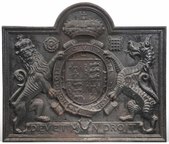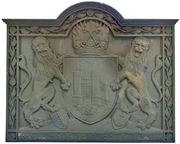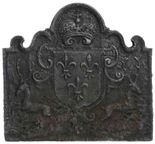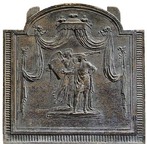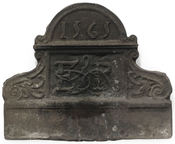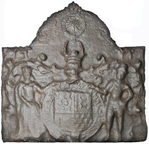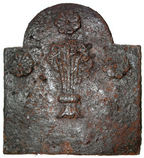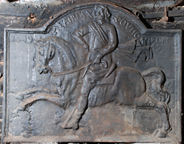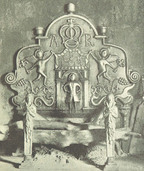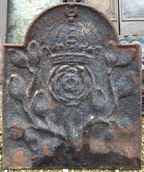-
319
Description: Arched rectangular shape; cyma-reversa edging; Tudor royal shield, garter, crown, motto and supporters (crowned lion and dragon); Tudor rose to right of lion’s head, portcullis to left of dragon’s head; temp. Elizabeth I.
Notes: This a replica cast from a modern pattern by Thomas Elsley Ltd. of London in imitation of a Tudor original.
Copies of this fireback are known.
Inscription: [Garter] HONI SOIT QVI MAL Y PENSE / [motto] DIEV ET MON DROIT.
Arms: Tudor royal - Elizabeth I
- Decoration tags:
- rectangular with round arch (shape)
- cyma reversa/ogee (edging)
- whole carved pattern
- armorial
- royal
- text
Manufactured: in the late-19th to early-20th century at Portland Metal Works, Great Titchfield Street in the London area of England.
Current location: not known.
- Attached to series:
- Tudor royal armorial firebacks
-
1178
Description: Arched rectangular shape; moulded top edge with undulating floriate border within fillets intersecting at the corners; in each corner a rose; along the bottom, the motto Multi Societate Tutiores - With many more safe; within the border, shield, supporters and crest
Notes: Blazon: Argent, upon a rock issuant from the base proper, inscribed 1824 in gold numerals, a quadrangular castle also proper, pennons flying to the sinister from each tower gules; crest: In front of flames proper issuant from a coronet of four roses argent, barbed and seeded proper, set upon a rim Or, two keys in saltire, wards upwards, sable; supporters: On the dexter side a lion guardant Or, resting the sinister hind leg on an escutcheon argent charged with a rod of Aesculapius gules, and on the sinister side a like lion resting the dexter hind leg on an escutcheon argent charged with an anchor sable. The Alliance Assurance Company was founded in 1824 and merged with the Sun Insurance Company in 1959. The arms were granted in 1933. An openwork version of this fireback (i.e. with the background voided) was formerly displayed outside its offices. Christie's auction, London, sale no.7006, 19 May 2005, lot 34 (£384).
Inscription: MVLTI SOCIETATE TVTIORES
Arms: Alliance Assurance Company
- Decoration tags:
- rectangular with round arch (shape)
- fillet (edging)
- whole carved pattern
- heraldic
- armorial
- text
Manufactured: in the early- to mid-20th century in England.
Current location: not known.
- Attached to series:
- Corporate firebacks
-
824
Description: Rectangular with complex quasi-arched rectangular top; ovolo moulded edging; shield with Royal arms of France in a swirled cartouche; above, an English crown; below to right and left, a prancing stag.
Notes: The combination of the English crown and French arms is common and may relate to the marriage of Charles I and Princess Henrietta Maria of France in 1625; although the framing of the pattern is very similar to others of the same basic design, the style suggests a different pattern maker. Christie's auction 21 Jun 2011 lot 208 (£2,750).
Copies of this fireback are known.
Arms: France modern
- Decoration tags:
- rectangular with round arch (shape)
- ovolo (edging)
- whole carved pattern
- armorial
- animals
Manufactured: in the early- to mid-17th century possibly in the Weald area of England.
Current location: not known.
- Attached to series:
- Ornate border series
- Miscellaneous royal firebacks
- Anglo-French armorial firebacks
-
933
Description: Carved wooden fireback pattern. Arched rectangular shape with fillet and cavetto-moulded edging; a canopy with swagged drapery descending from ribbon bunches, beneath which stand two figures: behind, a female angelic figure, right breast exposed, blowing a trumpet held in her left hand and holding an arched rectangular shield in her right hand; in front, a classically dressed male figure wearing a face mask; slatted extensions to the side and bottom; two battens to the rear of the pattern, visible at the top.
Notes: The significance of the scene has not been identified. Christie's auction 3 Jul 2002 lot 160 (£588).
- Decoration tags:
- rectangular with round arch (shape)
- fillet (edging)
- whole carved pattern
- planklines
- pictorial
- architectural
- humans
Manufactured: in the mid- to late-18th century in France.
Current location: not known.
- Attached to series:
- Patterns
-
261
Description: Plain rectangular bottom panel with fillet on top; above, rectangular panel with fillet and ovolo-moulded edging, within which the initials, ER, ornately carved, intertwined with floral tendrils; on each side, a scrolled bracket with double fillet edging, enclosing [?] ears of corn; on top, a narrow cornich, with an arch above, scrolled at each end and with double fillet edging, enclosing the date, possibly formed of individual stamped letters.
Notes: The 'ER' initials should not be assumed to be those of Elizabeth I. Formerly at Ockwells Manor, Cox Green, Berkshire. Christie's auction 4 Nov 2008 lot 259 (£3,750).
Copies of this fireback are known.
Inscription: 1565 / ER
- Decoration tags:
- rectangular with round arch (shape)
- complex individual (edging)
- whole carved pattern
- individual numbers
- text
- plants
Manufactured: in 1565 in the Weald area of England.
Current location: not known.
- Attached to series:
- Personal firebacks
- Miscellaneous pattern firebacks
-
1259
Description: Plain rectangular plate; shield, garter, helm, mantling and supporters of the Blount family, Lords Mountjoy; above, a Garter enclosing a sun charged with an eye, all surmounted by an earl's coronet; decorative edging of the arch in low relief.
Notes: The arms are those of Charles Blount, 8th Baron Mountjoy (1563-1606), who was invested Knight of the Garter in 1597. He was created 1st Earl of Devonshire in 1603 and the original fireback, of which this is probably a copy, therefore dates from between 1603 and 1606. Blazon: 1. (Blount) Barry nebuly of six Or and Sable; 2. (Ayala) Argent, two wolves passant Sable on a bordure of the first eight saltires Gules; 3. (Mountjoy) Or a tower Azure; 4. (Gresley) Vair. The fireback was made by taking a worn casting of the Mountjoy arms (for a clearer example see no. 740) and using it as a pattern, adding an extension above with the decorative edging and the crowned Garter and sun, the detail of which is sharper than the armorial below. The Garter and sun as a badge of Charles Blount has been noted on two contemporary book bindings. The fireback may have come from Dedisham Manor in West Sussex, which belonged to a cadet branch of the Blount family from 1545 to 1636 and which, in the latter year, was sold to Richard Onslow who later built Clandon Park.
Inscription: Garter motto [mostly illegible]
Arms: Charles Blount, KG, 8th Baron Mountjoy, Earl of Devonshire
- Decoration tags:
- rectangular with round arch (shape)
- none (edging)
- carved stamps
- whole carved pattern
- heraldic
- armorial
Manufactured: in the early-17th century possibly at Dedisham Furnace, Rudgwick in the Weald area of England.
Current location: Clandon Park, West Clandon, Surrey, England.
Museum number: 1441937 (part of the National Trust museum group)
- Attached to series:
- Personal armorial firebacks
- Mountjoy series
-
896
Description: Arched rectangular shape; no edging; three 'daisy' flowerheads, top centre and in each shoulder; central plume of six ostrich feathers issuing from what appears to be a wreath surmounting a tree stump.
Notes: Excavated from the ruins of Cloughoughter Castle in County Cavan, which had been rendered uninhabitable in a siege of 1653. Until the early 16th century the castle had been in the hands of the O'Reilly family. On some versions of the O'Reilly arms the crest is shown as a plume of ostrich feathers, although this may be a misrepresentation of the usual crest of a tree with a snake entwined about it.
- Decoration tags:
- rectangular with round arch (shape)
- none (edging)
- carved stamps
- heraldic
- plants
Manufactured: in the early-17th century in Ireland.
Current location: Parke's Castle, Fivemile Bourne, Co. Leitrim, Ireland.
(part of the Heritage Ireland museum group)
- Attached to series:
- Miscellaneous stamp firebacks
-
37
Description: Arched rectangular shaped; cavetto moulded edging; male figure in dress of the period, right hand on hip, left hand holding reins, astride a prancing horse; date and inscription (letter 'N' reversed) follow inside top edge.
Notes: Thomas Fairfax, 3rd Lord Fairfax of Cameron (1612-1671), commander of the New Model Army, which probably prompted the epithet, conqueror. 1649 was the year of Charles I's execution, to which Fairfax was opposed. Copies were advertised in Longden & Co.'s (Sheffield) catalogue c.1911, and in the Carron Company's catalogue.
Copies of this fireback are known.
Inscription: 1649 LD FAIRFAX COVNQVIROR
- Decoration tags:
- rectangular with round arch (shape)
- cavetto (edging)
- whole carved pattern
- pictorial
- historical
- text
- animals
- humans
Manufactured: in 1649 in England.
Current location: in private hands, Cowbeech, East Sussex, England.
- Attached to series:
- Commemorative firebacks
-
1210
Description: Individually designed quasi-arched rectangular shape; astragal edging; central portico with framed doorway and sloping roof, in which stands a male figure dressed in contemporary style; above the roof, the date, and above that, the initials TKM arranged in triad and around a flower head, this inscription enclosed within a five-sided ribbon compartment held at the top corners by a pair of mirrored dancing cherubs each of which holds in their outer hand a wand surmounted by a fleur-de-lys; below them are mirrored vine designs terminating in a grape bunch, and below each of them a mirrored swirled snake, its head reversed; towards the outer side of these snakes are a pair of mirrored birds within a curved cartouche of slightly raised relief that is associated with a swirl on each side of the fireback that terminates the astragal edging on each side and which ascends via a step surmounted by a miniature urn on each shoulder of the back to the top which is surmounted by an acorn shape; above the ribbons held by the cherubs, is a stylised crown between the initials AR; the above features are limited by a horizontal astragal, though the portico descends below it, and which is supported at each end by a simple Doric column enclosing the bottom panel which is otherwise plain.
Notes: The initials AR are of Anna Regina - Queen Anne. Finely cast but of naïve design, another fireback of the same design but with different inscriptions and dated 1723 is Bowness on Windermere. Illustration from Cowper, 1899, p.179.
Inscription: A R / TKM [triad] / 1714
- Decoration tags:
- rectangular with round arch (shape)
- astragal (edging)
- whole carved pattern
- individual letters
- individual numbers
- heraldic
- mythological
- text
- humans
- plants
Manufactured: in 1714 possibly at Backbarrow Furnace in the Furness area of England.
Current location: Low Graythwaite Hall, Hawkshead, Cumbria, England.
- Attached to series:
- Rawlinson series
-
1037
Description: Arched rectangular shape; fillet edging; central rose with stem and two branches with leaves, surmounted by a crown.
Notes: The rose is more naturalistic than heraldic. Criterion Auctions, Bath, 10 Sep 2016 lot 168.
- Decoration tags:
- rectangular with round arch (shape)
- fillet (edging)
- whole carved pattern
- heraldic
- plants
- objects
Manufactured: in the early- to mid-17th century in England.
Current location: not known.
- Attached to series:
- Miscellaneous royal firebacks
